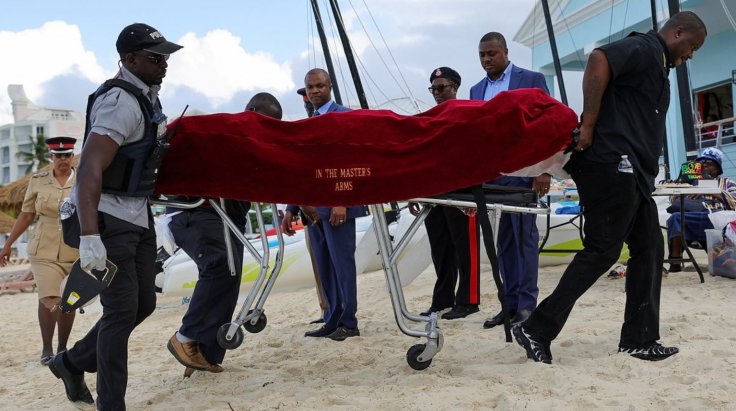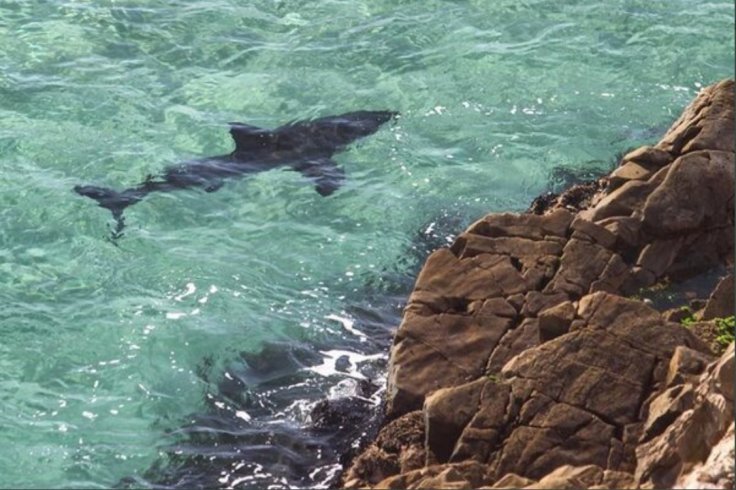The newlywed from Boston, who was killed in a shark attack while paddleboarding with her husband the day after their dream Bahamas wedding, has been identified. The woman has been identified as Lauren Erickson Van Wart, 44, by Bahamian police, who succumbed to injuries sustained in the shark attack, the Royal Bahamas Police Force said on Tuesday.
The shark attacked Van Wart while she was paddleboarding with a relative, off the shores of the five-star Sandals Royal Bahamian Resort in western New Providence, an island off the Bahamas, as reported by the police. A lifeguard, noticing the woman in distress, promptly came to her help but could not save her.
Tragic Death
The lifeguard performed CPR but the shark attack had inflicted severe injuries to the woman’s right hip and upper limb. Unfortunately, attempts to revive her proved unsuccessful. Witnesses on the nearby beach are said to have heard screams as the horrifying incident unfolded, according to vacationer Debra DeWeese who spoke to DailyMail.com.
Grim photos and videos of the distressing scene shared afterward show the victim’s covered body being transported back to the beach on a gurney and subsequently loaded into an ambulance.
Rob Waldron, the CEO of Curriculum Associates, where Lauren Erickson Van Wart worked as a math editor, paid tribute to her dedication and commitment to students.
“Our team is heartbroken and grieving the loss of a dear and trusted colleague and friend,’ he said.
“Lauren was a beloved member of our math editorial team, and she infused her deep dedication to students and educators into every material she touched. Her commitment to excellence and outstanding work was driven by a higher purpose, focused on improving learning outcomes for all.
“Our Curriculum Associates community is mourning this tragedy and extends our deepest love and support to Lauren’s wonderful husband and all of her family.”
Royal Bahamian Police Sergeant Desiree Ferguson told reporters: “Shortly after 11:15 a.m. police were notified that a female visitor from Boston, Massachusetts, USA was attacked by a shark.

X
“According to our initial reports, the female along, with a male relative were paddle boarding just at the rear of a resort in Western New Providence, some 3/4 miles out from the shoreline when she was bitten by the shark.
“A lifeguard on duty who saw what was happening went out in a rescue boat, retrieved the victim, along with the male relative and brought them to safety CPR was administered to the victim.
“However, she suffered serious injuries to the right side of her body, including the right hip region and also her right upper limb.

X
“Emergency Medical Services responded to this scene they thoroughly assessed the victim and they declared that she show she showed no vital signs of life.”
Desperate Efforts but Unsuccessful
DeWeese added that it took a couple of hours to bring the woman back to shore, and afterward, a wheelchair was brought out to help the man believed to be her husband. “I can’t imagine what the husband is going through,” DeWeese – who was on a day pass from a cruise – added in a Facebook post.

X
DeWeese mentioned that “the staff and some guests are a bit traumatized.”
The specific type of shark that attacked the woman was not immediately identified, although tiger sharks and bull sharks are known to inhabit the waters off the coast of the Bahamas.
Gavin Naylor, the program director of the International Shark Attack File in Florida, said in an interview that there have been several shark-related fatalities reported in the Bahamas over the past five years.
He pointed out that the Bahamas, with its substantial tourist population, sees many people in the water, including visitors who want to view sharks from fishing boats or engage in shark diving activities.

“So the sharks get acclimated, and the animals are a little bit less cautious than they otherwise might be,” he said.
Naylor also said that the Bahamas is home to between 30 to 40 shark species. Among them, the Caribbean reef shark, the bull shark, the tiger shark, and the black tip shark are identified with the highest bite frequency.
“Usually, it´s an accidental bite. They think it´s something else,” he said. “Once in a while, they´ll actually single out people, and it´s very intentional.”
Fatal shark attacks are rare, averaging only about five to six reported worldwide each year, with the majority occurring in Australia.






